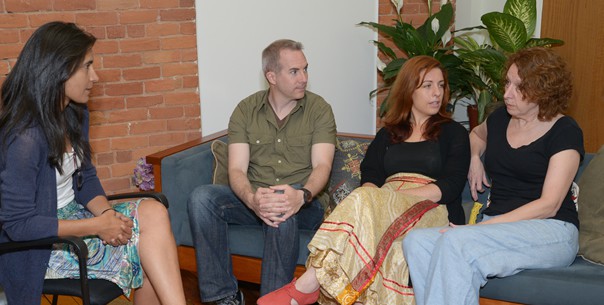About Dialogic Practice

Dialogic Practice emphasizes listening and responding to the whole person in a context – rather than simply treating his or her symptoms. In psychiatric crises, this is accomplished primarily through a treatment meeting, or Open Dialogue.
This conversation, or dialogue, is not “about” the person, but is instead a way of “being with.” This process mitigates the sense of isolation and distance that a crisis can produce and gives the person and their important others the experience of being heard. Ultimately, this allows them to participate more meaningfully in both the conversation and the resulting decisions about their own lives.
.
| The Twelve Key Elements of Dialogic Practice (Olson, Seikkula & Ziedonis, 2014) |
1. Two (or More) Therapists in the Team Meeting |
2. Participation of Family and Network |
3. Using Open-Ended Questions |
4. Responding To Clients’ Utterances |
5. Emphasizing the Present Moment |
6. Eliciting Multiple Viewpoints |
7. Use of a Relational Focus in the Dialogue |
8. Responding to Problem Discourse or Behavior as Meaningful |
9. Emphasizing the Clients’ Own Words and Stories, Not Symptoms |
10. Conversation Amongst Professionals (Reflections) in the Treatment Meetings |
11. Being Transparent |
12. Tolerating Uncertainty |
Dialogic Practice Training Courses
International Certification Training in Dialogic Practice
Introductory Intensive in Dialogic Practice in Open Dialogue
Dialogic Practice
Institute Faculty
“Dialogic process is a humane way of working with people in distress as well as those who care about them. It does not need to replace any techniques – it enhances other approaches. Whereas in other practices the “therapeutic alliance” is something that may be valued, it can be taken for granted. Dialogic process puts a focus on that alliance and this way it enriches all approaches.’
Sandra Steingard, M.D.
Level II Graduate – IDP
Medical Director, The Howard Center
“Best Doctors in America,” 2003 onward.
 The Institute is the only North American teaching facility that specializes in providing world-class training in Open Dialogue and Dialogic Practice delivered by the field’s leading experts and developers.
The Institute is the only North American teaching facility that specializes in providing world-class training in Open Dialogue and Dialogic Practice delivered by the field’s leading experts and developers.